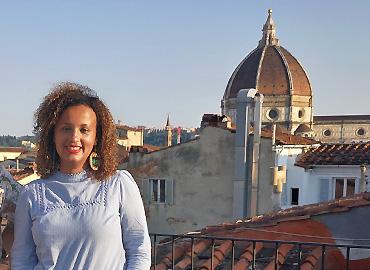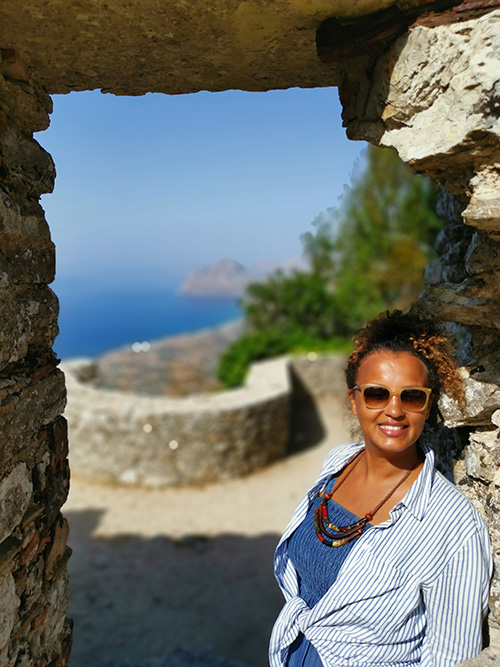Angelica Pesarini in Florence, with the Cathedral of Santa Maria del Fiore in the background.Photo credit: All images courtesy of Angelica Pesarini.

Santa Maria del Fiore in the background.
Photo credit: All images courtesy of Angelica Pesarini.
Angelica Pesarini’s path to academia began with a deep-rooted desire to better understand her own identity as a Black Italian.
Pesarini joined the Faculty of Arts & Science last year as assistant professor in a newly created position that, for the first time, links the Department of Italian Studies with the Centre for Diaspora & Transnational Studies.
Born in Rome, Pesarini is a Black Italian with Eritrean and Somalian ancestry.
“I was raised in the north of Italy, and despite having a wonderful childhood, I noticed I was the only Black child everywhere I went,” she says. “I never had a Black teacher or saw non-white students in class. It was only me. Plus, the topics we studied at school didn't represent me or my family. I remember often wondering, ‘why aren’t there other people like me?’”
Growing up in the nineties, she was frustrated with the constant questions about how she was able to speak Italian so well, and where she was really from.
“These invasive questions made me realize that I needed to understand more about my identity,” she says. “I had to find my own history, and through academia, I found a path that allowed me to put some pieces of the puzzle together.”
She is currently sharing her knowledge of Black Italian history through courses such as History and Counter-Stories in the Black Mediterranean, which focuses on Italy’s postcolonial ties with Libya, Eritrea, Ethiopia and Somalia.
Beginning with the Italian invasion of Eritrea in 1890 to the current so called “refugee crises,” she teaches her students how “there are stories within migration processes,” says Pesarini. “Each person is an individual with their own story and background. It’s so important to gather these stories.”
I was raised in the north of Italy, and despite having a wonderful childhood, I noticed I was the only Black child everywhere I went. I never had a Black teacher or saw non-white students in class. It was only me. Plus, the topics we studied at school didn't represent me or my family. I remember often wondering, ‘why aren’t there other people like me?’
She is also teaching Black Italian Cultural Production, which explores the landscape of Italian books, music, cinema and television, as well as visual arts and fashion created by Italians of African descent.
The course not only examines the art, but also explores related tensions and frictions that arise amid discussions on race, gender and sexuality, identity and citizenship. “I’m thrilled to teach such topics,” says Pesarini. “And the students seem really enthusiastic to have these courses within Italian studies.”
In addition to teaching, Pesarini has been busy writing.
She recently co-edited and contributed an essay to The Black Mediterranean: Bodies, Borders and Citizenship, which brought together scholars working in geography, political theory, sociology and cultural studies.

The book examines the current migrant “crisis” in Europe in the Central Mediterranean, raising questions such as: what is the role of borders in controlling migrant flows from North Africa and the Middle East?
She is currently working on a book of individual accounts of experiences with race, gender and identity lived by two generations of women born to white Italian fathers and Black east-African mothers in the former Italian colonies in East Africa (1890-1941), many of whom later migrated to Italy in the 1970s.
“Going back to the idea of looking for my own history, I went to Eritrea and Ethiopia and interviewed women born during the fascist period from white Italian fathers who usually left behind the children and mothers,” she says. “What did it mean to be a Black Italian raised in that specific context?”
The book will capture their experiences, focusing on areas such as love and intimacy; violence and shame; and home and belonging.
My hope is that this book fills a gap by addressing discussions of race, gender and identity in colonial and postcolonial Italy. I hope it also contributes to the debates on coloniality and racism in Italy, a country that likes to portray itself as a ‘white’ country and dismisses the importance of its colonial legacies.
“My hope is that this book fills a gap by addressing discussions of race, gender and identity in colonial and postcolonial Italy,” says Pesarini. “I hope it also contributes to the debates on coloniality and racism in Italy, a country that likes to portray itself as a ‘white’ country and dismisses the importance of its colonial legacies.”
Active in the Italian anti-racist front, she is also working on the impact of the Black Lives Matter movement in Italy in the aftermath of the murder of George Floyd. “Being actively involved in the Italian anti-racist movement, since 2020 I've been conducting interviews with fellow Black activists to analyze differences and similarities with BLM and also to analyze the networks of solidarity and resistance we have been putting together against racism,” she says.
Though new to Toronto and the U of T community, her work on the Black Italian experience has been recognized in Italy where she was recently named one of the 100 Women of the Year by a national weekly magazine.
Such recognition just adds to her motivation, and she is keen to continue her work in Canada.
“I’m fighting to dismantle some of the rigid and oppressive walls that very often keep academia, and academics, detached from the everyday life of people who do not have access to this environment,” she says. “Knowledge confers a great deal of power, thus, I try to take the knowledge I have outside the classroom.
“At the same time, I also seek to challenge academia with knowledges considered as inadequate or not ‘scientific’ enough. It’s pivotal for me to teach my students that their experiences are invaluable sources of knowledge and that it’s important to look for ‘alternative’ epistemologies.”


